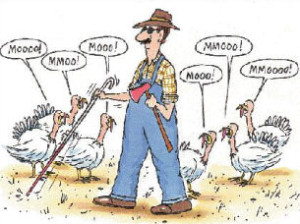Happy Wednesday, dear readers!
Your humble blogger hopes your week is proceeding at a quick pace, and that you are clearing off that to-do list so that you can have a restful and meaningful Thanksgiving Holiday.
In the meantime, your humble blogger brings you an interesting if unpublished decision (it’s interesting to your humble blogger, anyway). Remember folks – if you cite an unpublished decision in California you will be thrown in a gulag and will get no potatoes this winter!
The matter is that of Bolanos v. WCAB and Jimenez. Mr. Bolanos was a building owner who hired a certain gentleman, Aragon (not to be confused with Aragorn, King of Gondor, one the last of the Numenor and heir to Isildur), who had an otherwise valid contractor’s license but had allowed his workers’ compensation insurance to lapse.
When an employee, Jimenez (“applicant”), sustained injury during the work being performed for Mr. Bolanos, Jimenez sought benefits from Aragon, who later declared bankruptcy, and then from Mr. Bolanos, who was the technical employer by operation of law.
Now comes the fun part – While applicant filed an application for adjudication some 3 months after the date of injury, he did not actually sue Bolanos until 2011, around the time when Mr. Aragon declared bankruptcy.
Furthermore, even though an application was filed shortly after the injury in 2003 naming Mr. Aragon as the employer, and UEBTF was joined less than a year later in 2004, Mr. Bolanos was not joined as a party defendant until 2009!
Mr. Bolanos then asserted that latches and the statute of limitations barred any claims against him.
The WCJ ruled in favor of applicant on the statute of limitations defense, arguing that just because the attorney knew that Mr. Bolanos was the property owner, did not mean that he knew Mr. Bolanos would be the ultimate employer.
Mr. Bolanos’ petition for reconsideration also did little to help his case, as the split panel concurred with the WCJ. The dissent, however, reasoned that allowing this claim against Mr. Bolanos to proceed now, joining him some six years after the date of injury, would encourage more stale claims to be presented. Also, because applicant had an attorney that was aware of Mr. Bolanos’ position in the case, the claim should be barred by the statute of limitations.
The Court of Appeal granted review and in an unfortunately unpublished decision reversed the WCAB majority and the WCJ. The Court then went on to apply a 1-year statute of limitations. Citing McGee Street Productions v. WCAB (2003), the COA noted that a new defendant cannot be added after the statute of limitations has run.
Furthermore, the statute was NOT tolled because more than a year prior to adding Mr. Bolanos as a party, applicant was aware of his rights to file a workers’ compensation claim as evidenced by the fact that he pursued these rights by filing a claim against Aragon.
Here’s my favorite part of the ruling, however. UEBTF argued that Mr. Bolanos was required to provide applicant with a claim form. The Court of Appeal ruled that a claim form must only be provided “where the employee does not know of his right to file a claim… Here, although Bolanos never complied with section 5401, Zapata’s filing of a timely workers’ compensation claim demonstrates he was not ignorant of his rights.”
Happy Wednesday!


